Electric vehicles offer fuel savings and a smooth ride. Here are the best EVs for every lifestyle.
With gas prices on the rise, making the switch from a gas-powered car to an electric vehicle might seem even more appealing. Gone are the days when your only option for an electric hybrid was the Toyota Prius. Now that a variety of automakers have entered the market, many stylish and spacious options are available today. To help you choose the right one, this post discusses things to know about electric vehicles (EVs) and highlights some of the best electric cars for different lifestyles.
What To Know Before Buying an Electric Vehicle
The first thing to know about EVs is that they aren’t one-size-fits-all. EVs are actually broken into three car types — hybrids, plug-in hybrids, and fully electric vehicles.
Hybrids vs. plug-in hybrids vs. fully electric cars
Hybrid electric vehicles use a mix of gas and battery motors to run, but this type of car doesn’t get plugged in to charge. Instead, the battery is charged by power from the gasoline engine and regenerative braking. The pairing of combustion energy and an electric motor can improve fuel economy.
A plug-in hybrid is also powered by internal combustion and an electric motor, but you need to plug in the car to charge the battery. On the other hand, all-electric cars — the focus of this roundup — run solely on an electric battery that you must plug in to recharge, either at home or at a charging station.
How to charge your electric vehicle
You can charge your car using a regular 120-volt outlet at home, or you could invest in a 240-volt mounted charger. While the fast charger may be more expensive, it’s convenient. A 120-volt outlet might take several days to charge a car fully, whereas a 240-volt outlet could offer a sizable charge overnight.
If you have range anxiety – the fear that you won’t be able to find a charging station on the road when you need one – there are many places to juice up a battery pack thanks to expanding charging options. Public charging stations exist and some gas stations may have charging areas too.
How long it’ll take to charge your car at a charging station can depend on the charge type. Filling your battery using a supercharger at fast-charging stations could take less than an hour. How far a full charge lasts will also vary depending on the car. Electric cars often get more than 200 miles fully charged; however, long-range models like the Tesla Model 3 can drive over 300 miles before needing another charge. You can search for the range that different cars offer at FuelEconomy.gov.
Advantages of electric vehicles
A main perk of going electric is the opportunity to save on gas, but the electric car incentives don’t end there. Cars with an electric powertrain can have much lower maintenance costs because there are generally fewer moving parts to service. For example, there’s no need to change oil.
Electric vehicles are not entirely maintenance-free — for example, you may still need to have periodic services for breaks and tires — but the service schedules and costs may be less frequent and cheaper.
Environmentally, electric cars don’t produce any tailpipe emissions, so you’re helping the planet. In some cases, purchasing a new car that’s electric may qualify you for a federal tax credit of up to $7,500.
What Electric Vehicle Should You Buy?
Choosing the best electric car for you comes down to how much you want to spend and how you plan on using it. Here are the best EVs for different lifestyles to help you choose the right car for you:
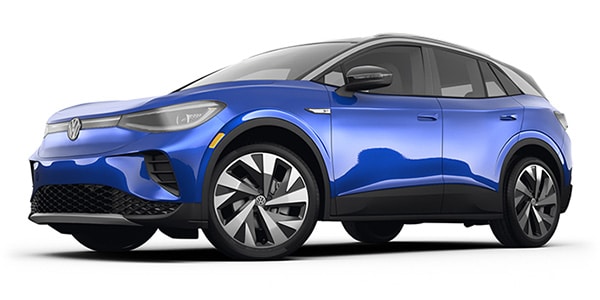
Best electric vehicle for dogs: Volkswagen ID.4
- EPA-estimated range: Up to 249 miles per full charge
- MSRP: Starting at $40,760
When you’re trekking around with man’s best friend in tow, space is your second-best friend. The Volkswagen ID.4 is a fully electric SUV that offers a roomy backend that could be perfect for transporting one pup or several. The vehicle boasts 37.6 cubic feet of backseat legroom and up to 64.2 cubic feet of cargo space when the rear seats are folded down.
Dog hair is notoriously difficult to vacuum from upholstery, but the Volkswagen ID.4 has you covered here as well with a faux leather interior option for easier cleanup. Driver assistance tech, like traffic alerts, blind-spot monitoring, and lane assist can help ensure that you, Fido, and Fifi get where you need to go safely.
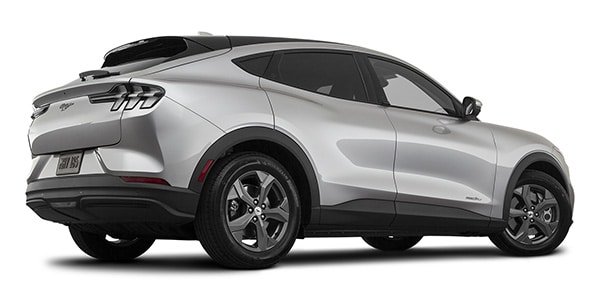
Best electric vehicle for families: Ford Mustang Mach-e
- EPA-estimated range: Up to 314 miles per full charge
- MSRP: Starting at $43,895
If you’re looking for an electric family car that’s functional but still stylish and fun to drive, you may not need to look much farther than the Mustang Mach-e.
A mix of sport and utility personified, the Mustang Mach-e has roomy backseats, decent headroom, and the capability to go from 0 to 60 mph in 3.5 seconds. This could give you the look and feel of driving a sports car when heading to and from PTA meetings. How’s that for getting the best of both worlds?
The Mustang Mach-e offers 29.7 cubic feet in the trunk and 59.7 cubic feet in cargo space when the rear seats are folded down. Whether you’re taking a road trip or simply taking kids to soccer, dance, and football practice, this car has the space to get you, them, equipment, or luggage around town.
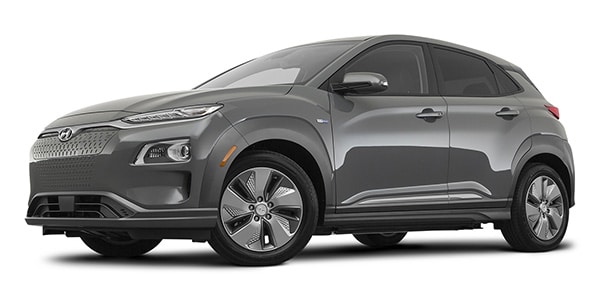
Best electric vehicle for city dwellers: Hyundai Kona Electric
- EPA-estimated range: Up to 258 miles per full charge
- MSRP: Starting at $34,000
The Hyundai Kona Electric falls into the subcompact SUV class, which gives you the perks of an SUV while still being small enough to park and be functional in the city.
Rear seating in this vehicle may not be roomy enough to haul large furniture, but it could provide a comfortable ride through back streets and enough cargo space for grocery and shopping runs.
Safe driving features like lane departure warnings, blind-spot assist, and collision avoidance can be handy during rush hour when traffic is bumper-to-bumper and pedestrians are crossing every which way.
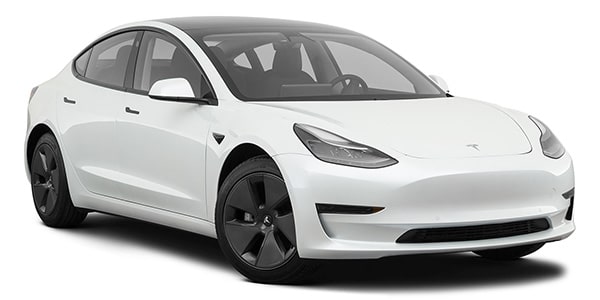
Best electric vehicle for techies: Tesla Model 3
- EPA-estimated range: Up to 353 miles per charge.
- MSRP: Starting a $46,990
Tesla is known for being one of the most innovative brands worldwide and arguably the first company to make electric cars “cool.” Beyond the futuristic appeal of the car’s look, and touch infotainment screen, pioneering features like self-driving can make it an enjoyable ride for techies.
The car also has several Easter eggs (or unexpected features) which can make the car a fun conversation starter. For example, turning on Santa mode changes the Tesla on the dash screen into Santa riding a slay. For your charging convenience, Tesla has 30,000 charging stations worldwide, so you may be able to easily find a charging station when you need it. The car also comes with 360° cameras, parking assistance, and a full sunroof from the front to the back of the car.
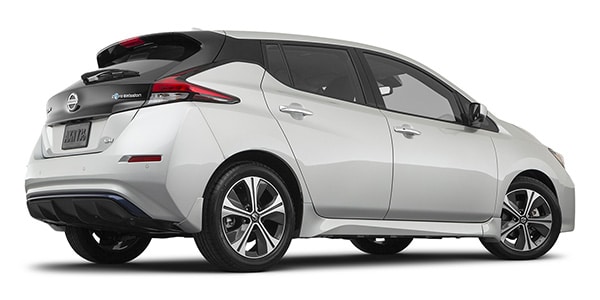
Best electric vehicle for a tight budget: Nissan LEAF
- EPA-estimated range: Up to 149 miles for the Nissan LEAF S and SV; 226 miles for the Nissan LEAF S PLUS
- MSRP: Starting at $27,400
The Nissan LEAF isn’t a snazzy or flashy hatchback, but it’s currently the lowest-priced EV that you can buy, with the base model starting at a little under $28,000. Because of the price, this car could be a good one for a first-time car buyer on a tight budget.
Compared to the other cars on this list, the lower price point does mean you sacrifice a bit of range. The base model Nissan LEAF gets just 149 miles of range off a full charge. But if you pay a bit extra for the PLUS model, that range bumps up to 226 miles.
As far as space and utility, the Nissan LEAF is pretty roomy with comfortable back seating and cargo space for luggage and shopping. Safety-wise, there are lane departure warnings, blind-spot warnings, traffic alerts, and more.


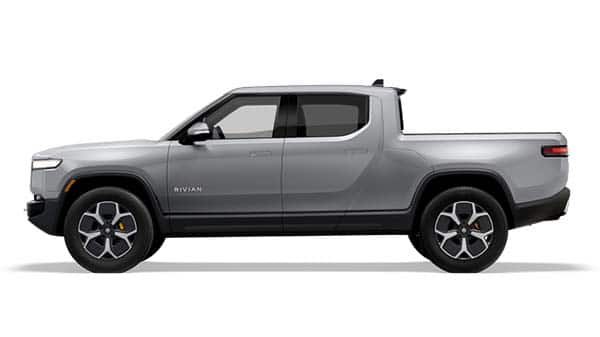
Best electric vehicle for off-roading and camping: Rivian R1T
- EPA-estimated range: Up to 314 miles per full charge
- MSRP: Starting at $67,500
The Rivian R1T light-duty pickup truck offers comfort and versatility for drivers who plan on hauling heavy loads, riding off-road, and spending time off-grid. This electric pickup seats five and can tow 11,000 pounds.
Rivian R1T drivers can make use of 62 cubic feet of storage within the bed, front trunk, rear storage bin, under-seat compartments, center console, and gear tunnel. A nifty cubby space between the cabin and truck bed can fit luggage and other items, freeing up room in the back and cabin interior.
Other utility features include two 120-volt outlets in the truck bed and a full camp kitchen with a two-burner cooktop, four-gallon water tank, collapsible sink, and full cookware set. The truck’s max ground clearance is 14.9 inches and the all-wheel-drive feature can help you avoid getting stuck while traversing rough terrain.
How To Make the Switch From Gas to Electric
Moving from a gas-powered car to an electric car can mean a big lifestyle change. If you forget to charge your phone at night, you can always charge it the next morning or on the way to work. But if you forget to plug your car in the night before, that could throw off your entire day.
Like with any decision, it’ll be important to weigh the pros and cons, including the cost. While some more affordable electric car options are coming out, they could still be more expensive than cars with a gas-powered engine. When choosing between models, you’ll have to consider whether the upfront sticker price savings or long-term gas and maintenance savings is the bigger priority.
If you’re ready to make your next ride a new EV, there are options to fit every lifestyle with a variety of capabilities, finishes, and tech that can make the ride just as fun as arriving at your final destination.
About The Author
RateGenius
A better way to refinance your auto loan. RateGenius works with 150+ lenders nationwide to help you save money on your car payments. Since 1999, we've helped customers find the most competitive interest rate to refinance their loans on cars, trucks, and SUVs. www.rategenius.com
;)









